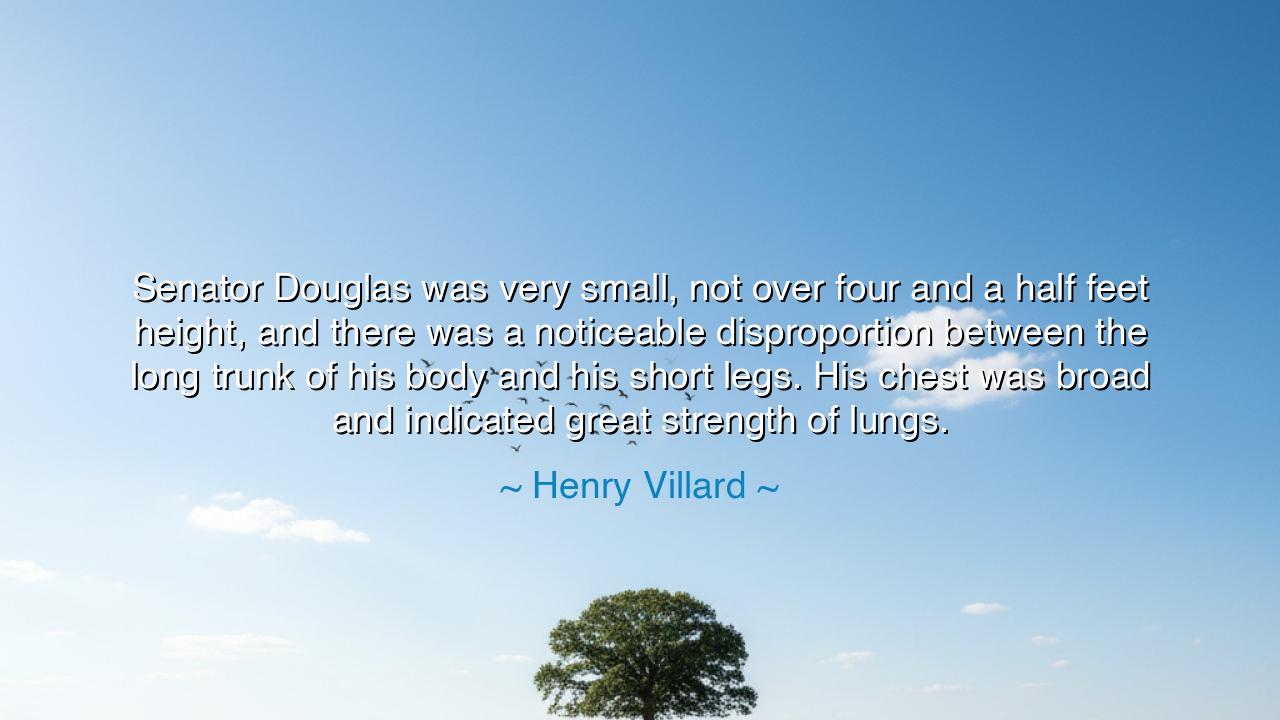
Senator Douglas was very small, not over four and a half feet
Senator Douglas was very small, not over four and a half feet height, and there was a noticeable disproportion between the long trunk of his body and his short legs. His chest was broad and indicated great strength of lungs.






Hear the words of Henry Villard, observer of men and chronicler of an age, who described one of America’s most fiery statesmen: “Senator Douglas was very small, not over four and a half feet height, and there was a noticeable disproportion between the long trunk of his body and his short legs. His chest was broad and indicated great strength of lungs.” In this description of Stephen A. Douglas, there is more than the detail of the body—there is a glimpse into the paradox of human greatness. For though Douglas was small in stature, his presence was large; though his frame was disproportionate, his strength of lungs, that is, his power of voice and debate, made him mighty among men.
The origin of this account lies in Villard’s writings on American politics in the mid-nineteenth century. Douglas, though diminutive in height, stood as a towering figure in the Senate. He was famed for his oratory, his ability to command attention, and his fierce debates with Abraham Lincoln. His body may have seemed an odd vessel, yet his chest—broad, expansive—housed the breath that fueled speeches capable of swaying multitudes. Villard’s words remind us that the essence of power is not always seen in the symmetry of limbs, but in the unseen forces of spirit, breath, and will.
History is filled with such examples, where outward form deceives, but inner fire astounds. Consider Demosthenes, the great orator of Athens. As a youth, his voice was weak, his delivery poor, and he was mocked for his lack of skill. Yet he trained with pebbles in his mouth, speaking above the roar of the sea, until his lungs became iron and his words carried the fate of Greece. Like Douglas, he proved that greatness of voice and spirit can overturn the weakness of stature. The body may be small, but the breath within can shake nations.
In Douglas we also see the truth that strength is not always physical but can be found in endurance, passion, and the will to be heard. His broad chest symbolized not mere anatomy, but a reservoir of energy and resolve. The debates with Lincoln that echoed across Illinois were not the contests of muscle, but of words—words propelled by breath, sharpened by intellect, and sustained by unyielding force of will. His short legs could not carry him far, but his voice carried him into the heart of history.
There is here a lesson in humility and perception. Too often men look upon outward form and dismiss the crooked, the small, or the disproportionate. Yet Villard’s description urges us to look deeper: what strength lies hidden? What unseen power dwells within? The oak may rise tall and commanding, yet even the bent reed has roots that clutch the earth. A small man with great lungs, a frail body with fiery spirit, a humble vessel with divine purpose—these have shaped the destiny of nations.
Think of Napoleon Bonaparte, mocked for his short stature, yet feared by emperors and kings. Like Douglas, he proved that greatness cannot be measured in inches. Or recall Helen Keller, blind and deaf, yet whose voice—though borrowed through others—moved millions. The body’s limitations did not determine the soul’s horizon. The true measure of man is not the form of his body, but the force of his being.
The lesson for us is clear: do not judge yourself, nor others, by outward proportion. What seems small may hold greatness; what appears weak may conceal immense strength. Instead of lamenting what you lack, cultivate what you possess. If your body is frail, strengthen your spirit. If your form is plain, refine your voice, your mind, your courage. For it is not the symmetry of limbs that shakes the world, but the force of character, the power of lungs, the fire of conviction.
Thus, O seeker, take Villard’s words to heart. Strength of lungs means more than breath—it is the symbol of endurance, of voice, of spirit that refuses to be silenced. Let your own breath be strong, your words filled with truth, your will unconquered by the judgments of appearance. For greatness is not granted to the tallest or the fairest, but to those who dare to pour the full measure of their strength into the service of their vision. So did Douglas, and so may you.






AAdministratorAdministrator
Welcome, honored guests. Please leave a comment, we will respond soon